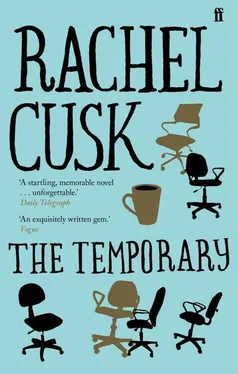Rachel Cusk - The Temporary
Здесь есть возможность читать онлайн «Rachel Cusk - The Temporary» весь текст электронной книги совершенно бесплатно (целиком полную версию без сокращений). В некоторых случаях можно слушать аудио, скачать через торрент в формате fb2 и присутствует краткое содержание. Год выпуска: 2013, Издательство: Faber & Faber, Жанр: Современная проза, на английском языке. Описание произведения, (предисловие) а так же отзывы посетителей доступны на портале библиотеки ЛибКат.
- Название:The Temporary
- Автор:
- Издательство:Faber & Faber
- Жанр:
- Год:2013
- ISBN:нет данных
- Рейтинг книги:5 / 5. Голосов: 1
-
Избранное:Добавить в избранное
- Отзывы:
-
Ваша оценка:
- 100
- 1
- 2
- 3
- 4
- 5
The Temporary: краткое содержание, описание и аннотация
Предлагаем к чтению аннотацию, описание, краткое содержание или предисловие (зависит от того, что написал сам автор книги «The Temporary»). Если вы не нашли необходимую информацию о книге — напишите в комментариях, мы постараемся отыскать её.
The Temporary — читать онлайн бесплатно полную книгу (весь текст) целиком
Ниже представлен текст книги, разбитый по страницам. Система сохранения места последней прочитанной страницы, позволяет с удобством читать онлайн бесплатно книгу «The Temporary», без необходимости каждый раз заново искать на чём Вы остановились. Поставьте закладку, и сможете в любой момент перейти на страницу, на которой закончили чтение.
Интервал:
Закладка:
Their night remained oddly bereft of recollections, for all that. Searching for its reality, he found only his phantoms of thought, a heap of discarded disguises garish by daylight. She had insisted on darkness, and in it he had felt lost and detached, his body given a command for which he had feared drunkenness and muddled desires would render it unfit. He wondered what amnesia it was that time and time again generated a pleasure in the anticipation of an act which was almost always destroyed by its fulfilment. In the end he had not been as awkward as he would have thought likely, but he had been so intent on giving a correct performance that it only occurred to him afterwards, straining to remember what had happened in the darkness, that Francine had done nothing at all. The acquiescence which had so struck him modulated at the first touch into submission, and in the very granting of her permission he had felt her sudden absence, as if she had what it was that she wanted and was leaving him to the business of his own pleasure. What struck him now was how confident she had seemed that this was enough, but for him the privilege had been a lonely one. He had finished it all quite quickly and had surprised himself by going straight to sleep. When he woke up in the morning she wasn’t in the room, and he had found her in the kitchen, sitting fully dressed at the table with a piece of toast on a plate in front of her. It was then that he had felt most unnerved by her. He had tried to make a joke of it, saying how much more organized she was than he, but she had looked at him as if she didn’t understand what he was talking about. When she left he had gone back to bed and lain inertly for half an hour, his head aching and blank.
He abandoned the evening’s regime and made a sandwich, carrying it into the sitting-room with the intention of eating it in front of the television. As he sat down on the sofa, the thought of his claims for Francine came round again on the trundling wheel of his consciousness. It all seemed rather comic to him now, and he smiled at his own foolishness. He supposed he hadn’t behaved very well, but he would be kinder to her when next they met. He turned on the news, and felt all at once overwhelmed with contentment at the warmth of his flat, the correctness of its comforts, his freedom to be alone there, while beyond the drawn curtains the city night began again the long drama of its uncertainties.
Nine
When Mr Lancing was in the office the atmosphere was one of siege, and his community laboured towards the goal of his next disappearance with dedication. When he had gone, to a meeting or to lunch, his large desk remained his monument in the centre of the office, bedecked with the insignia of leadership. If the meeting was in the building, his suit jacket often stayed behind, hung on the shoulders of his high-backed chair as vigilant as a sentry, with his briefcase to heel on the floor beside it. During these periods his presence seemed more imminent and the office was guarded, its revolutions whispered beneath tapping fingers and shrilling telephones, while neat, resentful stacks of finished work automatically accrued on his desktop. If the meeting was elsewhere his exit was triumphant, with a car to be called and his briefcase prepared, and in the wake of it there rose the euphoria of actors after the performance of a play. His people would sit back in their chairs behind his retreating figure, flushed and smiling, and a celebratory coffee would be made.
Francine searched Mr Lancing’s diary, of which she was the caretaker, and found to her concern that he had no meetings at all that day. He had arrived at his desk earlier than usual, rolling up his sleeves, and his jacket decorated the back of his chair with an aspect of entrenchment. He was reading a report Francine had typed for him the day before, his forehead wrinkled with concentration.
‘What the hell is this?’ he shouted, apparently to no one in particular.
The telephone rang and Francine answered it.
‘Good morning, Mr Lancing’s office.’
‘That Gary?’
‘No, this is his secretary. May I ask who’s calling?’
‘Tell him it’s Buck.’
Francine pressed the button which put the line on hold.
‘Mr Lancing!’ she called loudly. Mr Lancing frequently failed to respond to his name, and Francine had concluded that he must be slightly deaf. He looked around, as if wondering where the noise had come from. ‘Mr Lancing, Buck’s on the line for you.’
‘Buck?’ he said. ‘Who’s Buck?’
Francine considered her options. She had already offended several of Mr Lancing’s close associates by returning to their line when he failed to recognize them and questioning them further before allowing them through. She had got to know most of them by now, but she couldn’t remember Buck having called before.
‘He’s American,’ she said hopefully.
Mr Lancing gave the matter some thought. Suddenly he grinned and bounced slightly in his chair with excitement.
‘It’s Buck!’ he said. ‘Why didn’t you just put him on?’
Francine did so, and moments later the telephone rang again.
‘Is that Sally?’ said another American voice, this time belonging to a woman.
‘I’m afraid Sally doesn’t work here at the moment,’ said Francine.
‘This is Sylvia,’ said the woman.
‘Oh, hello, Mrs Lancing,’ said Francine. She had spoken to Mr Lancing’s wife several times before and still occasionally had to explain Sally’s disappearance. ‘This is Francine.’
‘What a pretty name,’ said Sylvia vaguely. ‘Listen, is Gary there?’
‘He’s taking a call at the moment,’ said Francine. ‘Is there anything I can help you with?’
‘It’s our son’s birthday tomorrow, Francine,’ said Sylvia. ‘I was calling for some gift ideas. Is there anything you could suggest?’
‘Well — how old is he?’
‘I believe he’ll be eleven years old tomorrow, Francine,’ Sylvia sighed. ‘My little baby, all grown up.’
‘What about — what about a bicycle? No, I suppose he’s already got one.’
‘A bicycle?’ said Sylvia. ‘Gee, that’d be fun. I don’t know. You say he’s already got one?’
‘I thought he might, that’s all.’
‘I was actually thinking we could get him some stocks.’
‘Socks?’ said Francine.
‘No, stocks, you know, like stocks and shares. Maybe you could talk with Gary about that.’
‘All right,’ said Francine.
‘Thank you so much, Francine. Do you know when Sally’s coming back?’
‘I don’t know.’ Francine was beginning to tire of the conversation. ‘She’s ill.’
‘I bet you’re hoping she’ll get worse !’ said Sylvia. She shrieked with laughter.
When Mr Lancing had finished his conversation, Francine approached him about the matter of the present.
‘I thought a bicycle would be nice,’ she said, growing more attached to her own idea.
Mr Lancing looked pensive. His hair was unkempt, as though he had forgotten to brush it. He looked as if he were wearing a wig.
‘Which one is it?’ he said.
‘Which what? Oh, I see, the one who’s going to be eleven.’
‘And you want to buy him a bike?’
‘It was only an idea. Your wife thought he might like some stocks.’
‘Stocks?’ Mr Lancing’s face lit up. ‘That’s a great idea! He’ll love it, he can hang the certificates on his wall!’ He motioned with his hands, demonstrating their placement.
Francine went to the ladies’ and stood behind the locked door in one of the cubicles. After a while she came out and looked at herself in the large mirror for a long time. When one of the other secretaries came in, she washed her hands and went back to the office. Mr Louche was cutting something from a magazine at his desk with a pair of scissors. He carried the severed page over to Mr Lancing and placed it in front of him.
Читать дальшеИнтервал:
Закладка:
Похожие книги на «The Temporary»
Представляем Вашему вниманию похожие книги на «The Temporary» списком для выбора. Мы отобрали схожую по названию и смыслу литературу в надежде предоставить читателям больше вариантов отыскать новые, интересные, ещё непрочитанные произведения.
Обсуждение, отзывы о книге «The Temporary» и просто собственные мнения читателей. Оставьте ваши комментарии, напишите, что Вы думаете о произведении, его смысле или главных героях. Укажите что конкретно понравилось, а что нет, и почему Вы так считаете.












